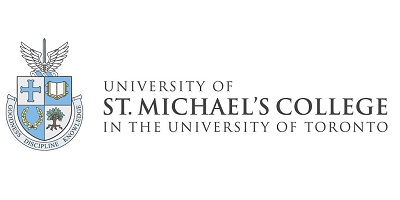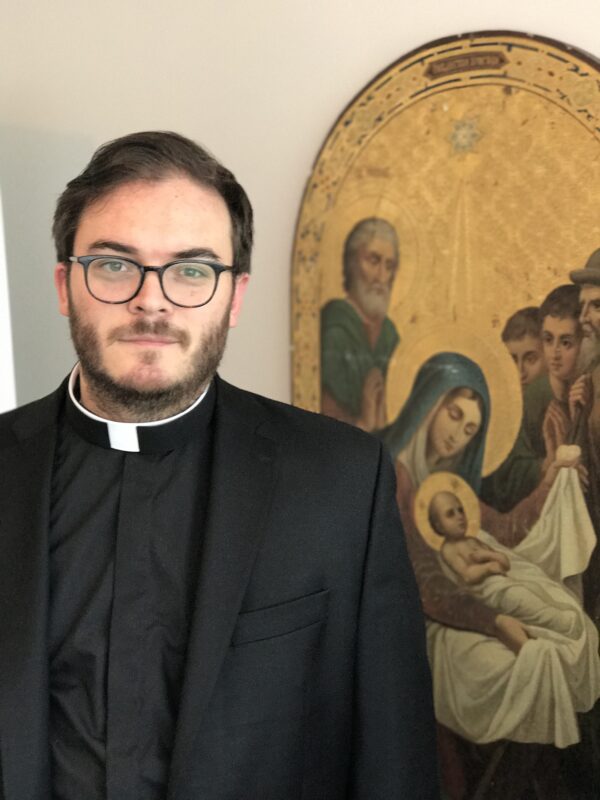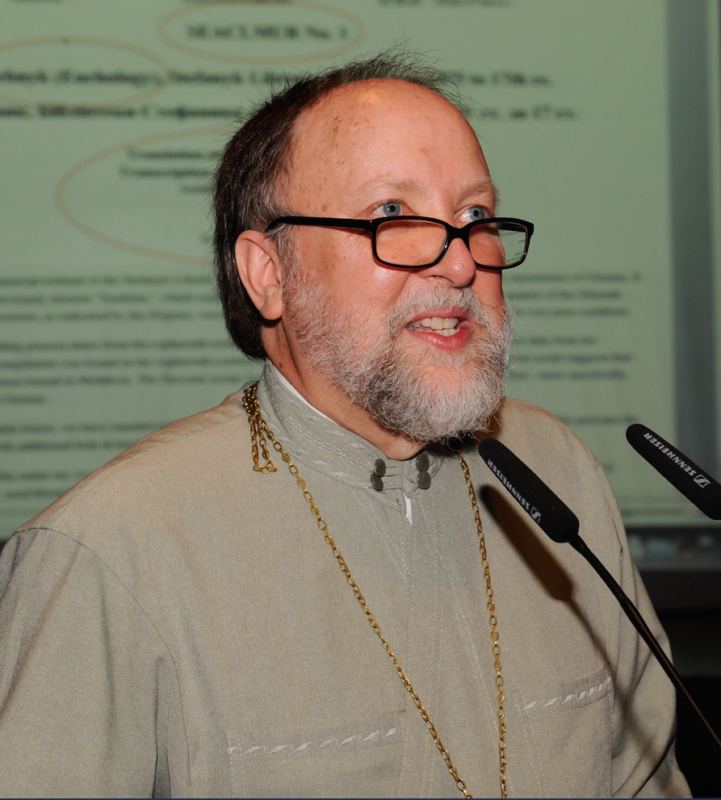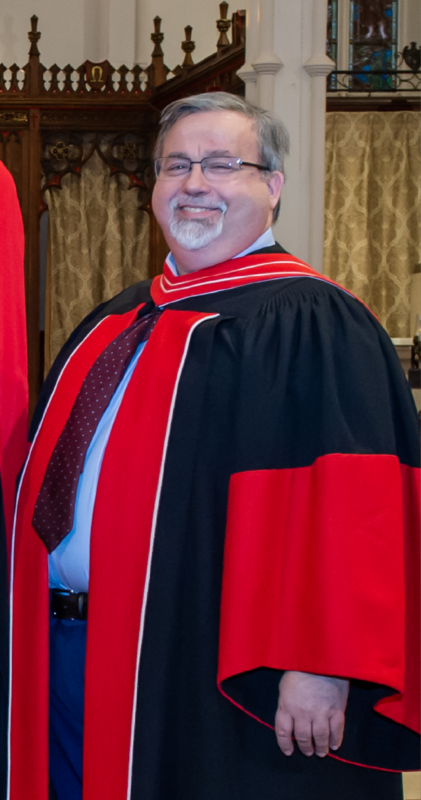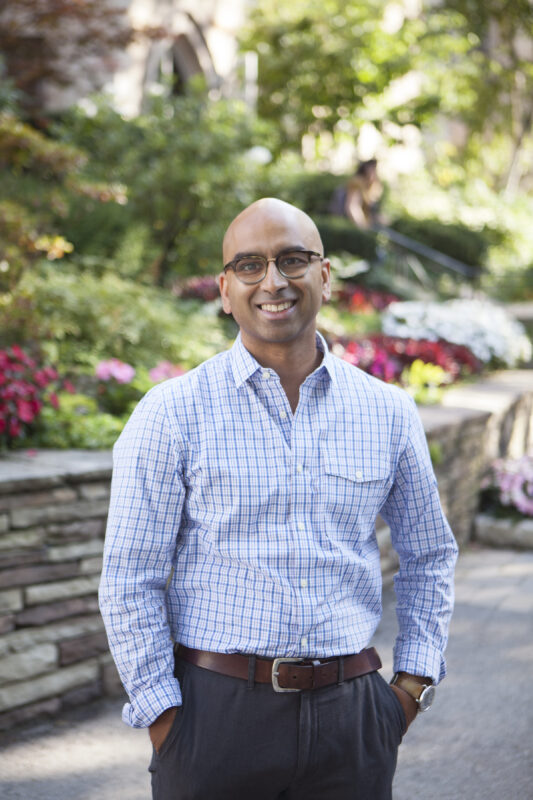For the Metropolitan Andrey Sheptytsky Institute of Eastern Christian Studies, (MASI), July saw the return of its renowned Study Days program after a four-year hiatus, as well the arrival of two top Patristics scholars to lead a week-long seminar for doctoral students that drew participants from Canada, the United States and Europe. Rounding out this summer’s offerings at MASI was an intensive course in Byzantine Eucharistic Liturgies. Through these various offerings, each addressed to a unique audience, the Institute continues to address the needs of the church, the academy, and those who simply want to learn more about their faith.
Leading the Patristics seminar were MASI’s two keynote speakers for their summer offerings, Fr. John Behr, PhD, who is the Regius Professor of Humanity at the University of Aberdeen, and Dr. Lewis Ayres, who is Professor of Catholic and Historical Theology at Durham University. Fr. Behr’s speech was entitled Reason Persuading Necessity: Gregory of Nyssa on the Human Being, while Dr. Ayres’ was entitled Justinian’s Vision of Christ: Necessary for Orthodoxy Today?”
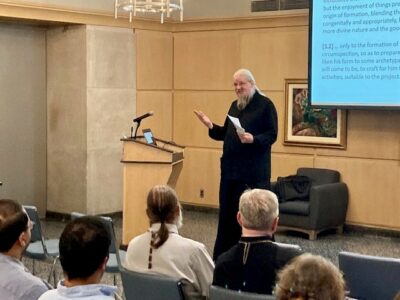
The ongoing interest in, and engagement with, the Church Fathers is a good sign for the church, says Fr. Behr, who notes that only by understanding the origins and development of church thought can we begin to understand today’s challenges and respond effectively.
Dr. Ayres agrees, noting that beyond the subject-specific insights into church history and thought gained through reading great minds of the early church, there is also a broader appeal across the humanities, and that comes from delving into how arguments are developed and presenting. Exposure to great thought benefits all readers, he says.
But for students, one of the greatest benefits of attending the Patristics Seminar was the opportunity to watch two long-time colleagues engage in a discussion, often – but not always – agreeing, and modeling for the doctoral students respectful, productive academic discourse.
“Prof. Fr. Behr and Prof. Ayres certainly modelled rigorous conversation. What touched me most is that this conversation clearly flowed, for each instructor, from years of dedicated scholarship pursued in faith,” says seminar participant Emily Barnum, a doctoral student from the University of Chicago, where she is studying New Testament and Early Christian Literature. “Nothing animates our study of these great texts more than approaching them from within a life of prayer. It was a great gift to study together during the day and pray together in the evening.”
The decision to offer a seminar led by two academics is one of the ways MASI serves the community, Fr. Behr and Dr. Ayres agree.
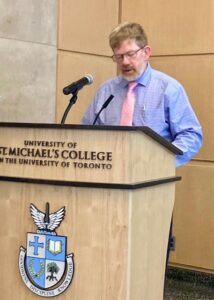
“Thirty years ago, when I was starting out, Toronto was one of the great places to study theology,” says Dr. Ayres, noting the city remains a strong draw for theological studies. Having two academics teaching together presented a unique chance to view issues in a variety of ways.
Fr. Behr also offered praise for MASI for inviting both academics to lead the workshop, noting that it gave participants a chance to see how questions – and answers – are formulated. Overall, he adds, the week gave students both firm information in a key subject area as well as the opportunity to ponder academic approaches to the classroom, a vital consideration for those who will become professors.
MASI was born out of an intensive summer program from its early days at Chicago Theological Union, when founder Fr. Andriy Chirovsky began a program of study at California’s Mt. Tabor Monastery.
Co-sponsored by St. Augustine Seminary, MASI’s Study Days program provides “an immersive experience in Eastern Christianity, both in its rhythm of prayer and in patterns of thought,” says the Institute’s Fr. Andrew Summerson, PhD, who helped organize this year’s classes. “Through Study Days, we bring the best of our tradition to the wider church. After a four-year hiatus, re-starting study days returns us to our original charism and is a good sign that post-COVID we are beginning to operate at full capacity in our service to the church and to the academy.”
The Metropolitan Andrey Sheptytsky Institute of Eastern Christian Studies is a centre of higher learning, research, ecumenical understanding, and prayer. It operates as an autonomous academic unit in the Faculty of Theology at the University of St. Michael’s College (USMC) in the University of Toronto. Based in Windle House at the heart of the USMC campus, the Institute specializes in the theology, spirituality, liturgy, history, and ecclesial polity of the Eastern Christian Churches, both Orthodox and Catholic.
The summer offerings at MASI were conducted in partnership with Pontifical Institute of Mediaeval Studies, the Centre for Medieval Studies, the Orthodox School of Theology at Trinity College, and the Lumen Christi Institute at the University of Chicago.
Fr. Alexander M. Laschuk, PhD has been appointed to a three-year term as Executive Director of the Metropolitan Andrey Sheptytsky Institute of Eastern Christian Studies (MASI). His appointment follows a yearlong appointment as interim director that saw the institute shift its instruction and lecture offerings into an online context while emphasizing collaboration with other institutions.
“In the past eight months as Interim Executive Director, Fr. Laschuk has enhanced the position of the Sheptytsky Institute as an autonomous academic unit of the Faculty of Theology,” said Dr. John L. McLaughlin, Interim Dean of the Faculty of Theology at St. Michael’s. “His willingness to continue providing this outstanding leadership at MASI holds great promise for the Sheptytsky Institute’s ongoing development as a centre of academic excellence in Eastern Christian Studies.”
Fr. Laschuk has civil and ecclesiastical doctorates in canon law from Saint Paul University and the University of Ottawa. His research interests include ecclesiology, penal law, and procedural law and he regularly publishes in these areas in addition to canonical consultancy and advocacy work with dioceses and clients across North America. He has taught regularly with the Sheptytsky Institute since 2010.
During Fr. Laschuk’s term as interim director over the past academic year, the Sheptytsky Institute has both shifted its instruction to remote delivery to accommodate pandemic restrictions and introduced multiple new lecture series to expand its offerings to the larger community. In addition to monthly series focused on hospital ministry during COVID and on campus ministry, MASI has launched a Friday Lenten lecture series on the Church Fathers. Presented by scholars from a variety of institutions, the Lenten series was specifically designed to support the needs of priests, 75 of whom are registered for the course.
“We see a need to provide continuing education in an accessible manner to clergy,” Fr. Laschuk says of the initiative, adding that the Ukrainian Eparchy of Toronto has encouraged the institute in this direction.
The shift to a predominantly online context as a result of the pandemic has also made new kinds of collaboration possible between MASI and other institutions. Seminarians in the past year have joined MASI courses from places as far away as England and Edmonton as a result of these connections.
Going into the future, Fr. Laschuk sees MASI as having a unique role to play in the life of the University. “St. Mike’s is a top-tier Catholic university, and we want to be comprehensive in our presentation of the Catholic faith, including attention to the Catholic East,” he says. Graduates of the St. Michael’s Faculty of Theology are bound for contexts in which they will encounter and work with Eastern Christians, and he considers it essential for those grads to understand the essentials of their faith and traditions.
This preparation goes beyond the classroom, as MASI has always emphasized the liturgies and practices that define the life of Eastern Christian communities. “Our chapel is open to anyone who wants to come, and can provide an experience in Eastern Christianity for anyone who attends,” Fr. Laschuk says.
The Metropolitan Andrey Sheptytsky Institute (MASI) heads into the 2020-2021 academic year with new leadership and a new faculty position in Patristics.
Fr. Alexander M. Laschuk has been named Interim Executive Director of MASI following the retirement of Fr. Peter Galadza on June 30 of this year. Fr. Laschuk is a priest of the Ukrainian Catholic Eparchy of Toronto and Eastern Canada, and serves in numerous ministries, including as Judicial Vicar of Toronto’s marriage tribunal. Until recently, he was also economos, or finance officer, of the Eparchy of Toronto and Eastern Canada. Fr. Laschuk has civil and ecclesiastical doctorates in canon law from Saint Paul University and the University of Ottawa. His research interests include ecclesiology, penal law, and procedural law and he regularly publishes in these areas in addition to canonical consultancy and advocacy work with dioceses and clients across North America.
Fr. Laschuk has regularly taught with the Sheptytsky Institute since 2010, and continues to teach in the Faculty of Canon Law at Saint Paul University, Ottawa, where he served as Interim Director of the Sheptytsky Institute in 2013-2014.
Dr. Sean Argondizza-Moberg has joined MASI on a one-year Contractually Limited Term Appointment as an Assistant Professor in Greek Patristics. Specializing in Christian asceticism in late antiquity, Dr. Argondizza-Moberg earned his doctorate at Catholic University of America’s Center for the Study of Early Christianity. The position, located within the Sheptytsky Institute, is renewable to a maximum of three years. Dr. Argondizza-Moberg is currently working on a book on monasticism and classical culture.
“We are delighted to have both Fr. Laschuk and Dr. Argondizza-Moberg joining us,” says Dr. John L. McLaughlin, Interim Dean of the Faculty of Theology. “Fr. Laschuk is a skilled academic who will offer strong leadership at MASI as it looks toward the future, while Dr. Argondizza-Moberg’s work in Patristics will strengthen our offerings to students in this key field.”
The Sheptytsky Institute is an autonomous academic unit of the Faculty of Theology of the University of St. Michael’s College (USMC) in the University of Toronto (U of T). It specializes in Eastern Christian Studies, including the theology, spirituality, liturgy, history, and ecclesial polity of the Eastern Christian Churches, both Orthodox and Catholic. MASI students specialize in Eastern Christian studies within the basic-degree and graduate degree programs of St. Michael’s College. All degrees are conjointly conferred by St. Michael’s College and the University of Toronto.
St. Michael’s pulled out all the (virtual) stops on Thursday to honour three key leaders as they move on to new roles and responsibilities. More than 90 people gathered online to celebrate the careers—thus far—of Principal Randy Boyagoda, Theology Dean James Ginther and Fr. Peter Galadza, Director of the Metropolitan Andrey Sheptytsky Institute of Eastern Christian Studies (MASI).
Festivities began with a slideshow of each man in action on campus—Fr. Peter with students at Windle House, Dean Ginther presiding at convocation, and Principal Boyagoda in Rome with Gilson Seminar students—all set to the jazzy strains of Natalie and Nat King Cole’s duet of “Unforgettable.”
Then President David Sylvester kicked things off with a welcome to guests, who ranged from students and Collegium members to colleagues and family. Dr. Sylvester recalled his own welcome party two summers ago, bemoaning the fact that the assembled could not celebrate in person in the sunshine of Scollard Park, as he had been feted.
As the program unfolded, however, the inability to gather together did not stand in the way of heartfelt praise for each man. Dr. Ginther offered a tribute to Fr. Galadza, who is retiring from MASI, citing his “dogged commitment to academics,” his “passion for Eastern Christian studies” and his deep faith.
The Dean recalled that even though the two men were doing doctoral studies at the same time at St. Mike’s, it was only during the negotiations in 2017 to bring MASI from St. Paul’s University in Ottawa to St. Michael’s that they met, and Dr. Ginther expressed great admiration for Fr. Galadza’s dedication to students, MASI and the Church.
In response, Fr. Galadza offered his thanks, and expressed his delight at finally being able to spend more time with Olenka, his wife of 41 years.
“God bless all of you,” he said, and guests responded with a flurry of virtual toasts and clapping emojis.
Then Dr. Sylvester offered thanks to Dean Ginther for his service to the Faculty of Theology, noting that, as both men are mediaevalists, the former knew the latter’s academic reputation long before the two met, given Dr. Ginther’s profile as a scholar of Robert Grosseteste and his work in digital humanities.
Calling him a champion of the Faculty, the President cited the Dean’s “tireless work” in renewing the graduate division of St. Michael’s, citing three new hires as an exciting indication of things to come.
Dr. Ginther responded with thanks to faculty staff and his colleagues, and told those assembled how much he is looking forward to returning to the classroom after his year-long research leave.
“It’s been 12 years” since he’s had a leave, he noted.
This prompted another flurry of toasts and clapping icons.
Then it was Dr. Boyagoda’s turn to be honoured. With some gentle teasing, the President noted that if he left anything out in his introduction “Randy would fill it in.”
Dr. Sylvester thanked the outgoing Principal for his vision for St. Michael’s, noting that he was at the forefront of the renewal of the university’s programming and repetition, helping to restore St. Mike’s to its place as the leader in Catholic education.
In his response, Dr. Boyagoda, who has been named Vice Dean, Undergraduate in the Faculty of Arts & Science at the University of Toronto, offered thanks to many people, and then concluded his remarks with an anecdote.
He had just been the basement of Elmsley Hall with a young colleague to seek out furniture for the office he will maintain at St. Mike’s, as he will teaching the Gilson Seminar next year. The new employee who greeted him thought he was a student.
“I’m leaving here feeling young!” he proclaimed, and everyone offered a virtual toast.
Then came a round of comments from such notables as Collegium Chair Fr. Don McLeod, CSB, and Dr. Christopher Brittain, Dean of Divinity at Trinity College.
It was not the in-person party that anyone had imagined, but it was a heartfelt send-off, and the community wishes all three godspeed as they head off in new directions.


